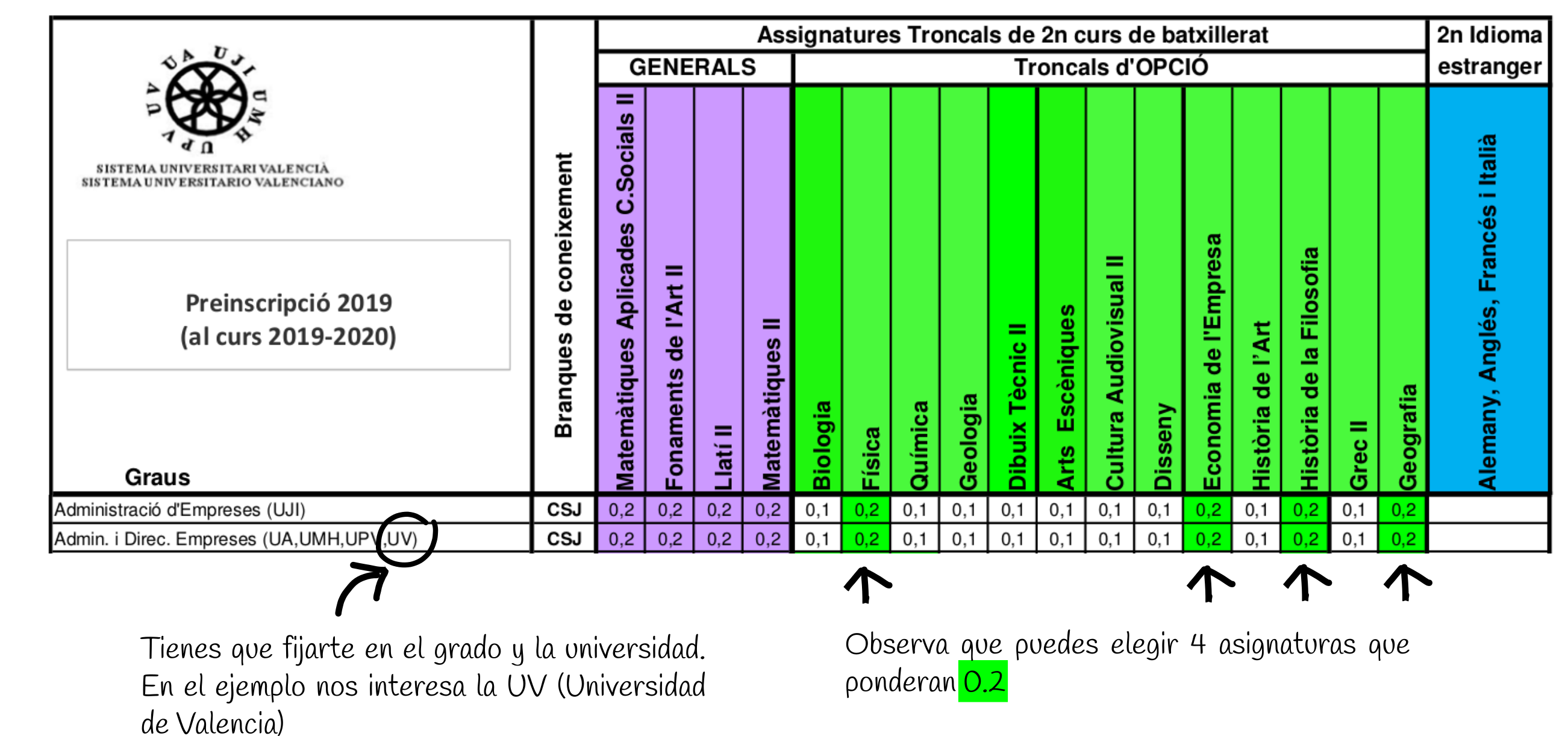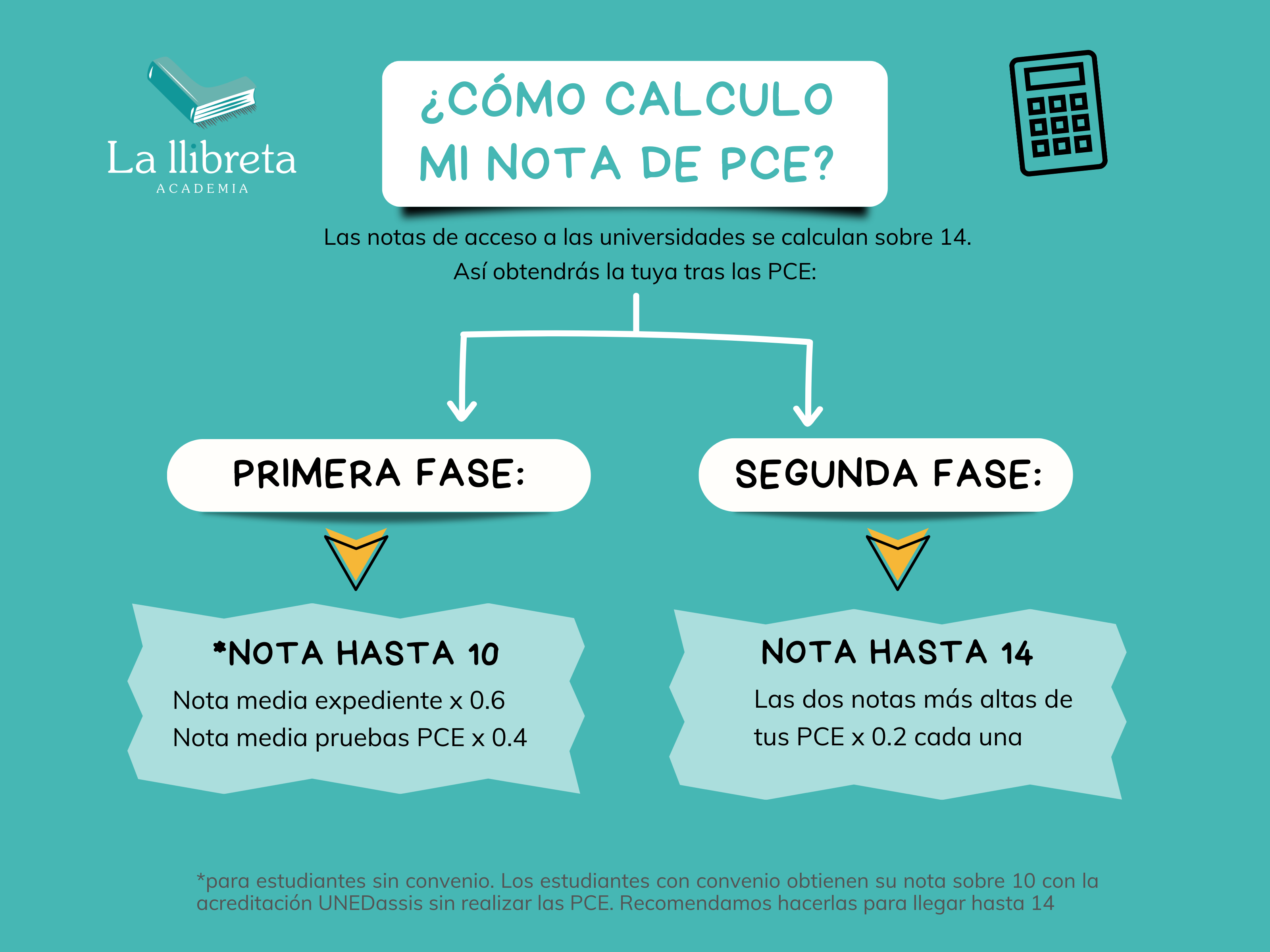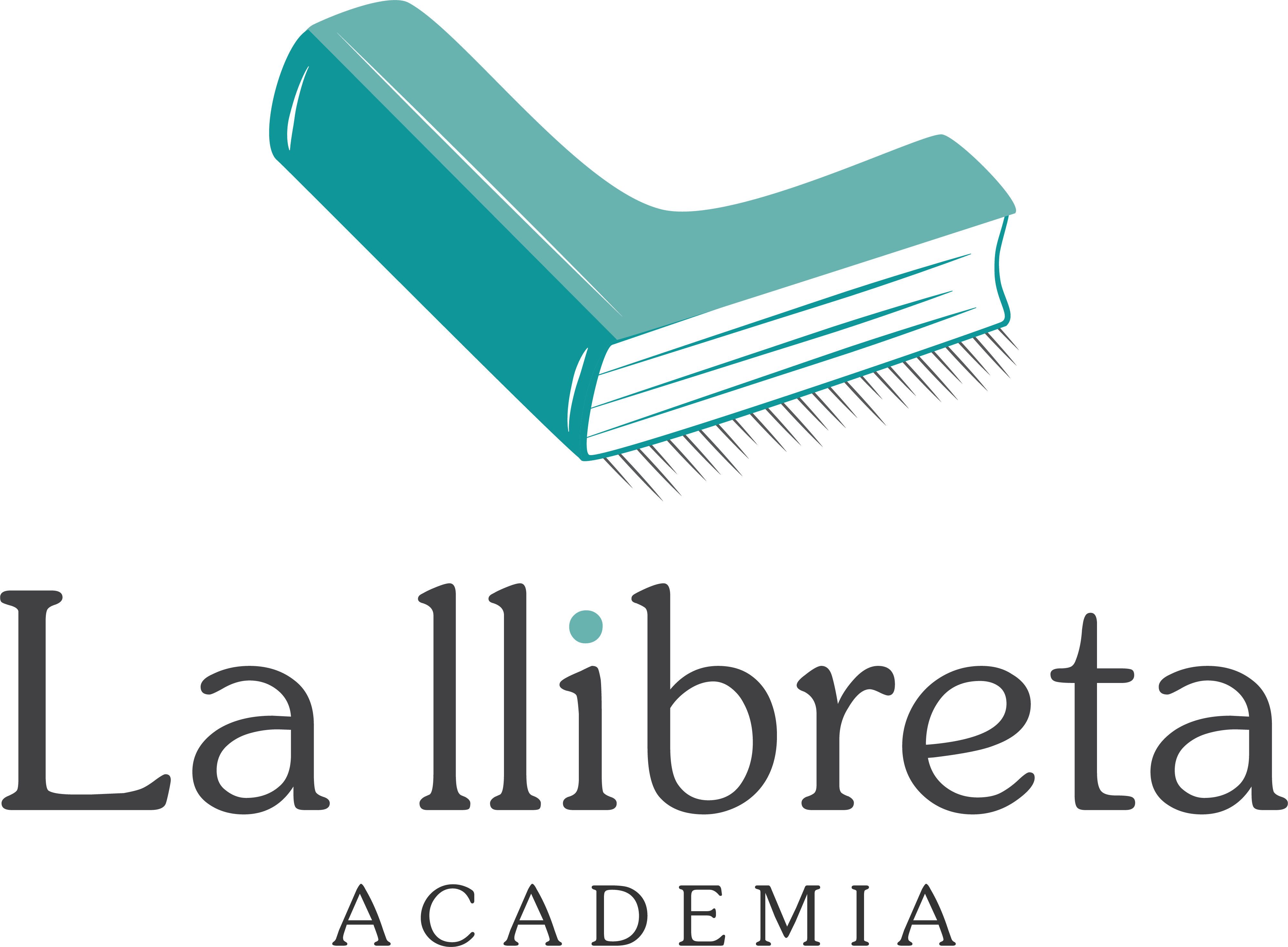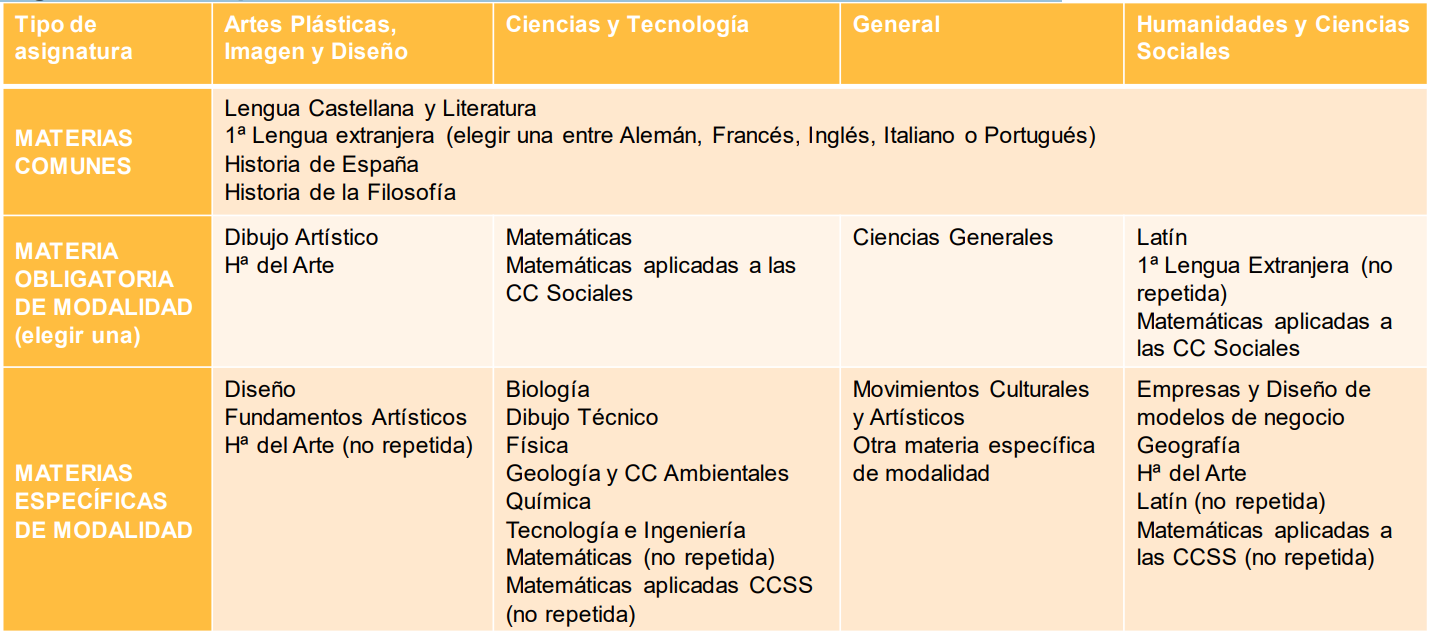What subjects should I choose for my PCE if I want to study a university degree in Spain? Which one has the highest weighting?
In this post, we explain which subjects you should choose for the PCE if you want to study for a university degree in Spain.
If you are considering taking the Specific Competence Tests (PCE) and wish to study at a university in Spain, it’s important to choose the right subjects. Here we provide information on which subjects to choose and how they can influence your admission score.
Before choosing your subjects, you should know your PCE itinerary. It’s important to understand that the number of exams you need to take for your PCE selectivity changes based on 3 factors:
- The university degree you want to pursue.
- The Autonomous Community where you will study.
- Your status as an international student, that is, whether or not you are a student with an international agreement.
If you were not aware of this information, we recommend that you first read our pages about the structure of the PCE and frequently asked questions about the PCE.
Which subjects should I choose for the PCE?
Here is the list of available subjects for the Specific Competence Tests (PCE) offered by UNEDassis: German, Biology, Technical Drawing, Design, Business Economics, Physics, French, Art Foundations, Geography, Geology, History of Spain, History of Philosophy, History of Art, English, Italian, Latin, Spanish Language and Literature, Mathematics, Mathematics Applied to Social Sciences, Portuguese, Chemistry.
![]() Remember to consider the university degree you wish to pursue and consult the weighting table to choose the subjects that will allow you to obtain the highest score in the PCE.
Remember to consider the university degree you wish to pursue and consult the weighting table to choose the subjects that will allow you to obtain the highest score in the PCE.
If you would like more information about the program of each subject, you can visit the UNEDassis page, where the specific content is detailed. Additionally, if you are interested in seeing solved exam examples in PDF format and videos, you can visit our exam page, where you will find useful resources to prepare adequately.
Why is better to choose subjects that weigh O.2 in the PCE?
When choosing the subjects, you want to take in PCE (Specific Competency Exam), it is very important to know which subjects weigh the most in the university you want to study (weigh 0.2). Let’s take an example for a mixed disciplines (social science) degree: Imagine you want to study Business Administration at the University of Valencia. In the following image you have the subjects and their weight for two very similar degrees offered by different universities

According to this table, the university recommends that among the subjects we choose, at least two of them should have a weighting of 0.2 (the more, the better, as we will have more options to increase our score). However, at a minimum, two of the subjects we select must be those with a 0.2 weighting in the table above.
Does this mean I can’t choose English or any other subject?
No, you can choose the subjects you want, and UNEDassis will weigh each one at 0.1 to reach 10. Then, the university, which will increase your score from that 10 to 14, will do so based on the grades you have obtained exclusively from the subjects that have a weighting of 0.2 in their table.
We already explained in the frequently asked questions post about the PCE how the PCE score is calculated, but we’ll refresh your memory. Look at the following infographic for a better understanding.
The score out of 10 is obtained as follows:
- 60% – The high school grade (which must be previously validated)
- 40% – The result of the PCE exams that the students have taken.
Admission Score = (0.2 x NMB + 4) + (0.1 x E1) + (0.1 x E2) + (0.1 x E3) + (0.1 x E4)
NMB= Average high school grade.
E= Score obtained in each specific competence test (PCE).
The score out of 14 is obtained as follows:
The two subjects with the best grades that have a 0.2 weighting are selected and multiplied by 0.2. The result is added to the admission score.

A person can take exams in English, history of philosophy (0.2), economics (0.2), and geography (0.2), for example. When they take the UNEDassis exams, each subject will be worth 0.1. These four subjects will make up 40% of the grade to be added to the high school grade. Once the total of the exams and the high school grade is obtained (always out of 10 points), the university selects the two highest grades that have a weighting of 0.2 and adds them to the previous score, thus achieving a score out of 14 points.
Imagine that this person has obtained the following grades (out of 10):
- English: 8
- History of philosophy: 6 —- weighting 0.2
- Economics: 9.5 —- weighting 0.2
- Geography: 8.5 —- weighting 0.2
- Average high school grade: 7
Admission Score = (0.2 x 7 + 4) + (0.1 x 8) + (0.1 x 6) + (0.1 x 9.5) + (0.1 x 8.5)= 8.6/10
Highest 0.2 weightings (economics and geography) : 9.5 x 0.2 + 8.5 x 0.2= 3.6/4
Admission score for Business Administration and Management: 8.6 + 3.6= 12.20/14
PCE Updates for 2024
As an important update this year, under the new implementation of LOMLOE, students taking the PCE EBAU now have the option to choose between History of Spain and History of Philosophy. According to annual PCE outcome statistics, Philosophy is recommended as it historically shows better statistical results. You can view these results here.
Another notable update is for those preparing for degrees in science and technology. This year, in the core subject options, you can choose between Mathematics II and Mathematics CCSS (Social Sciences). Statistical data suggest that Mathematics CCSS tends to yield better results than Mathematics II, so if both subjects have the same weighting (0.2), it would be advisable to opt for CCSS. However, if only Mathematics II is weighted for you, it’s important to do a personal analysis. If you have good skills in mathematics, you might consider choosing it to maximize your score along with the other two specific subjects you select.
Still have questions?
Don’t worry, we are happy to resolve them for you. Contact us!
Structure of the PCE
Discover how the PCE exams vary depending on the degree and province, as well as your type of high school program!
PCE FAQ
Have questions? Our selection of Frequently Asked Questions is here to help you!
List of UNEDassis subjects
Table of weightings of Spanish universities
You Might Also Be Interested In
Understand and make the most of the weighting tables of Spanish universities. Course 2023-2024
This article provides a detailed guide on the weighting tables of Spanish universities to help you maximize your admission score. It explains concepts like admission score, cutoff score, and how they relate to weighting tables. Additionally, it provides direct and up-to-date links to the weighting tables for the 2023-2024 school year, organized by autonomous communities. Understanding how these tables work will help you efficiently choose the subjects for the entrance exams and maximize your admission score.
UNEDASISS PCE Grade Calculator: Calculate Your Admission Score and Cutoff Score
UNEDASISS PCE Grade Calculator Your guide to knowing what score you need to achieve in your university entrance exams to access the degree program you want.University Entrance Exam (PAU)Specific Competency Exams (PCE)PAU +25PAGSHey! Are you ready to embark on your...
Essential Guide to Studying a Degree in Spain: Key Tips and Considerations
Guide to Studying in Spain: Discover How to Choose Your Degree, Prepare for University, and Manage the Duration and Costs of Your Studies.
Obtain Your Student Visa for Spain: A Comprehensive Guide
Empower Your Academic Future: Secure Your Student Visa for Spain with the Expert Guide from Academia La Llibreta
University Admission Guide in Spain for Students from the British Educational System: Post-Brexit
We simplify the path for students from the British educational system towards Spanish universities in the new post-Brexit era.
Administrative formalities REQUIRED to study in Spain
Administrative formalities REQUIRED to study in SpainAre you considering studying at a university in Spain as a foreign student? Great! Before you start, it's important to know that there are some administrative procedures you need to complete in order to access the...
Structure of PCE by city and university degree
We tell you which subjects you should choose based on the degree you want to study and the Spanish city where you are going to do so.
How to homologate your Bachelor’s degree to access the University in Spain
We tell you the procedure to homologate your Bachelor’s degree to access the University in Spain.
PCE Frequently asked questions
We resolve all your doubts about access to Spanish universities for foreigners (PCE). What the PCE are, which subjects to choose, exam models…
9 tips on how to write better essays
9 tips on how to write better essaysMost of our students find writing essays the most difficult part of an English exam. Follow this list of tips to learn how to successfully and confidently write your essay. 1. Manage your time effectively. You should spend: Planning...
PCE courses
ONLINE PCE course
Purchase our courses to complete them at your convenience.
Pre-recorded Video Material
ANUAL PCE
Classes from October to May.
Requirement to have a B1 level in Spanish.
In-person and/or online
Intensive PCE
Classes from January to May.
Requirement to have a B1 level in Spanish.
In-person and/or online







good afternoon,
my name is Kenzy I wanted to ask if I can still register for this year in the academy. I have a spanish level lower that b1 so i need to take a Spanish course beside the pce course. I also wanted to ask if i could take the pce in english. for the total score calculations if got a gpa 4 out of 4 what number should i put in the academic transcript score.
Good morning,
We are going to send you a personal email with all the answers to your questions to start our Spanish + PCE course.
Kind regards
Good afternoon,
Can I still sign up for the course in Biology and Math? I am an international student looking for the January/May session. I would like to speak more on that with someone of your colleagues. Feel free to drop me a line on my email gerganaml03@gmail.com.
Kind regards,
Gergana.
Hi, I’m applying for an university in Barcelona, so I’ll need to choose 6 subjects. Are all of the 6 subjects going to be valued as 0.1 or only four of them, just like in the example you wrote? I’m asking because I want to take an international course and I was thinking to start learning spanish this summer and mostly once in barcelona, so taking the test in spanish language and literature wouldn’t be easy for me. Also is it possible to take the pce in english? I’m going to take the one in Rome.
Hello, I recommend that you read this post where the structure of the PCE exams is explained, depending on where you want to study: https://academialallibreta.es/structure-of-pce-by-city-and-university-degree/?lang=en. Keep in mind that if you study in Barcelona, you will be required to choose Spanish language and literature, and as you correctly mentioned, it is a challenging subject for students who are not native Spanish speakers. I would suggest considering other cities in Spain to study the degree you desire since the structure is more flexible, like the voluntary PCE, free PCE, or PCE for Baccalaureate mode. In these pathways, you need to study between 2 and 4 subjects and can avoid studying Spanish language. We offer specific Spanish and PCE courses if you are interested in training with us.
Hello, if I need to take 4 subjects for medicine in Madrid (Maths 2, Chemistry, Biology, and Physics) which are weighted, can I also take a 5th PCE English exam even though it is not on the table for medicine? Will it affect my grade positively or would it not change my grade at all if I get a high score for it? Are only 4 subjects allowed for universities in Madrid?
Hi, Abigel, it depends. If your country has a reciprocity agreement, you can only take the subjects that are weighted 0,2 to increase your grade up to 14, it is not necessary for you to take English as it doesn’t affect your grade at all. If your country doesn’t have a reciprocity agreement, then you must take English and Maths II and then choose 2 subjects between Chemistry, Biology and Physic. We recommend Biology and Chemistry.